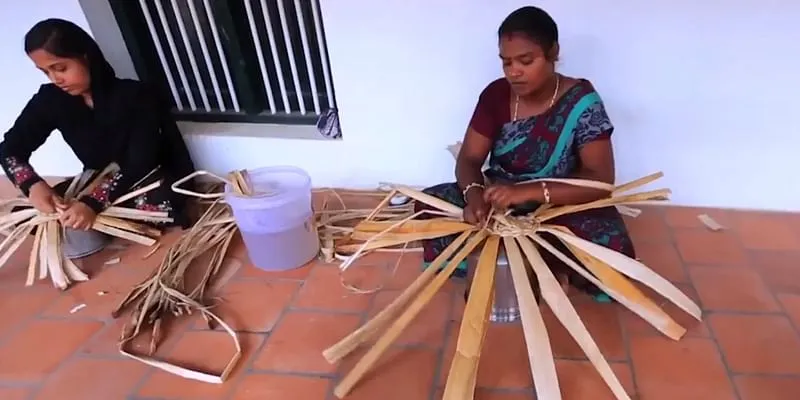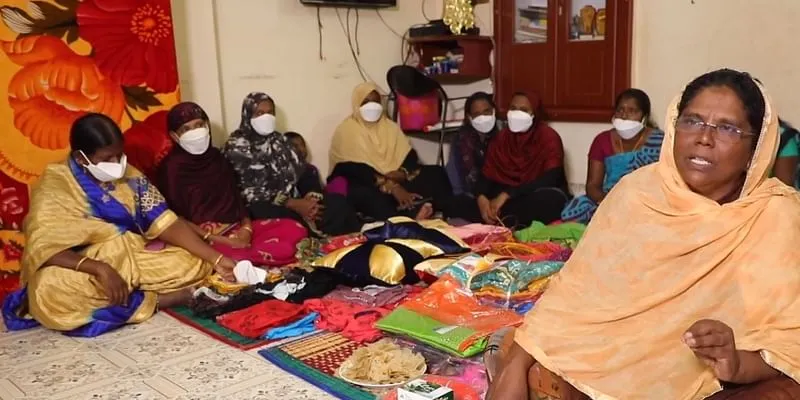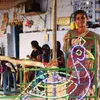How one woman is spreading a message of self-reliance and harmony in her village in Tamil Nadu
From starting with a small tailoring business to changing the lives of over 350 women in her village, Peer Banu’s story is all the mid-week motivation you need.
When Mohammed Peer Banu first arrived at her husband’s home in Eruvadi village in Tirunelveli as a young bride, she brought along a sewing machine to help her make a small living. Coming from a family of tailors, her brother had taught her the basics while she was still in school, and the young bride was determined to bring in a small income.
Over the years, the need to educate three children saw her exploring other ways to make money. She had heard about a basket making training programme that was run by the Srinivasan Services Trust (SST) through which she could increase her income.
“The field officers from SST explained how I could learn new skills, including basket-making, and expand my business and earn more money,” says Peer Banu — now the Head of the Bismi Self Help Group (SHG) — founded in 2006.

The women of the Bismi Self Help Group process banana fibre to make baskets.
Today, the 15 women-strong SHG makes and sells clothes, and baskets made of banana fibre, which they process themselves.
“During the training, everything was explained very clearly. The fibres had to be 40 cm long and 5 cm wide. We were taught to soak the banana palm bark for half an hour, then stretch it on a rack to dry before we could bend them into various shapes and designs before adding the final varnish,” she says.
In fact, the women of the SHG also took a loan and bought sewing machines. Peer Banu trained them to make school uniforms, nightdresses, and sari blouses. “I have trained over 350 women as tailors to start their own business and encouraged them to become financially independent. Almost everyone in the area knows me by name,” she proudly shares.
“I don’t take money from widows and women who come from very poor families. If they are looking to improve their lives, I help them do that,” she adds.
Putting the community first
Claiming that her monthly income of nearly Rs 6,000 is more than enough for her needs, she also says that she wants to be able to pay it forward to her community. She and the other women from the SHG have been volunteering to clean religious places and anganwadis in their area.
“When we visited the local anaganwadis, we saw that many children did not have chairs to sit on. Those who could afford it were bringing chairs from home. The mats on the floor were also in a terrible condition,” she says.
Peer Banu says seeing her own children well settled has motivated her to improve other children’s lives.

Peer Banu has trained hundreds of women to become financially independent
The women from the SHG pooled in money to provide chairs for the children who were forced to sit on the floor. They also bought fans for the children and regularly volunteer to keep the place clean.
“My oldest boy works as an inspector with the water board in Mumbai. My second son completed his mechanical engineering and works for the Indian Space Research Organisation, and my youngest has set up an ecommerce company, and helps me sell many of the things I make,” she says.
Small blessings
Before the pandemic, the SHG members would volunteer to clean the temples, mosques, and churches in the area. Since they come from different religions, they recognise service and humanity as the best way to serve whichever god they believe in.
In this spirit of unity, they have also been distributing kabasura kudineer — a traditional immunity-building drink — to help fight the spread of the COVID-19 virus.
“In the past, we would make Pongal for the whole village, and we would all sit together and eat. But that has stopped because of the pandemic,” she says.
Peer Banu says the skills and financial training provided by the SST has helped these women live life on their own terms.
“We are yet to default on paying back the loan we took when we initially started the Bismi SHG. Each member tries her best to pay her share. However, if there is an emergency and she can’t pay, everyone else in the group pools in and makes up the difference. We should not have to go to anyone for help,” she says, explaining her dream for all women.
“All women should be financially independent and be able to take care of themselves and their families. Don’t be dependent on anyone; only then can you really live life on your own terms. If anyone needs any help or support, you can always come to me, and I will train you and make you financially independent,” she says.
Edited by Suman Singh



![[Monday Motivation] This school dropout from Kashmir now owns an IT Company in the UK](https://images.yourstory.com/cs/5/f5a7f3304b1211e9b6645b8ae897d03e/MM-1626509456215.png?fm=png&auto=format&h=100&w=100&crop=entropy&fit=crop)




